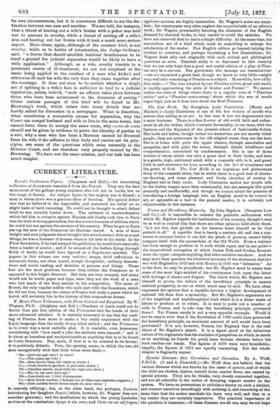T. Macci Rawl Trinummus, with Notes Critical and Exegetical. By
W. Wagner, Ph.D. (Deighton and Bell.)—Teachers of Latin could not do better than put this edition of the Trine/emus into the hands of their more advanced scholars. It is scarcely necessary to say that the read- ing of Plautua does more to make a boy really acquainted with the Latin language than the study of any other author ; and the Trinummus is in every way a most suitable play. It is readable, even humorous, considering with "how small a joke the ancients were amused ;" and it is about as harmless and unobjectionable as anything that is to be found in Latin literature. Nay, more, if that is to be counted in its favour, it is positively didactic. True, the opening scene, in which the two old men energetically wish that their wives were dead,— . mt.—Quid tun agit uxor ? ut valet?
Ca.—Pins quam ego vole. I Mr.—Bene hercle illam tibi valere et vivere. I *C.—Credo hernia te gandero, si quid mihi mallet. I
Ma.—Omnibus amide, good mihi eat, cupio ease item. I
Ca.—Eho to, tea uxor quid agit ?
MK.—Iumortalle est: I vivit victuraquest.
.CA—Bane herds nuntias, deosque oro ut vitae tuae superstes suppetaL I Ma.—Dum quidem hercle tecum nupta sit, sane velim,"
is scarcely edifying ; but, on the other hand, the prologue, Luxuria introducing her daughter Inopia (which, however, Dr. Wagner does not consider genuine); and the meditations by which the young Lysiteles arrives at the conclusions Apage te sis, amor, and Certa res en t ad frugem applicare animism, are highly instructive. Dr. Wagner's notes are excel- lent ; his countrymen very often neglect the exegetical side of an editor's work ; Dr. Wagner, presumably knowing the character of the English demand for classical books, is very careful to avoid the mistake. We have not observed that he omits a single (difficulty. At the same time, his annotations are of a kind which must do something to enlarge the scholarship of the reader. Few English editors go beyond helping the student to construe, and perhaps furnishing a few illustrations ; Dr. Wagner deals ably and originally with such critical and philological questions as arise. Classical study is so depressed in this country that we can only hope that a good and useful edition of a play of Plau- tus may be a success. The gentlemen who manage our examinations —we are examined a groat deal, though we know so very little—might very well take something of Plautus as a subject. Meanwhile, how oddly this reads:—" The tone adopted by our Plautine critics, great and small, is rapidly approaching the style of Gruter and Parens! " We cannot realise the state of things where there is a regular race of " Plautine critics" and a " Plautine controversy," about which the war of words rages high, just as it does here about the Real Presence.


































 Previous page
Previous page